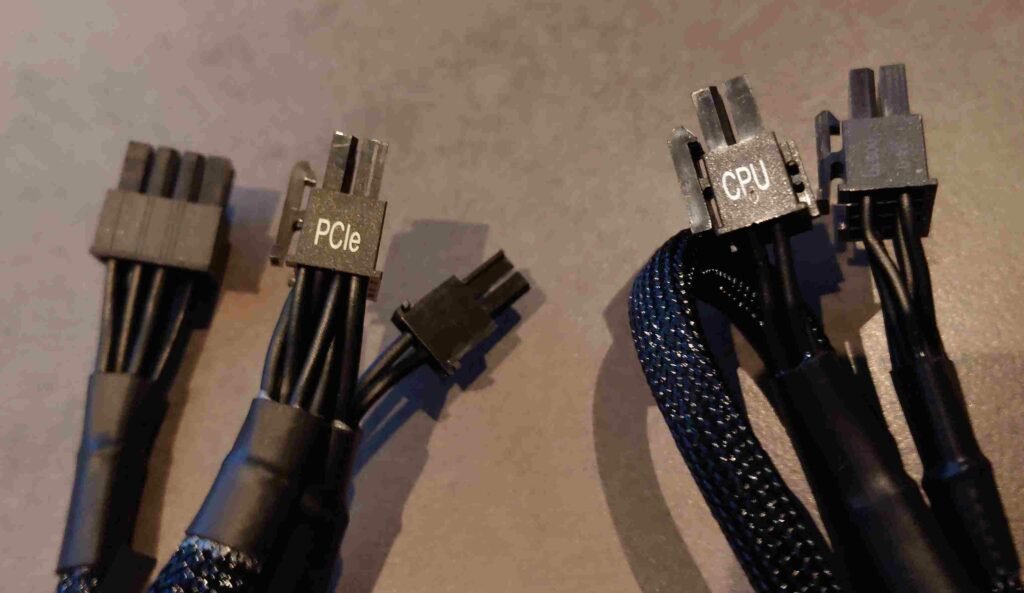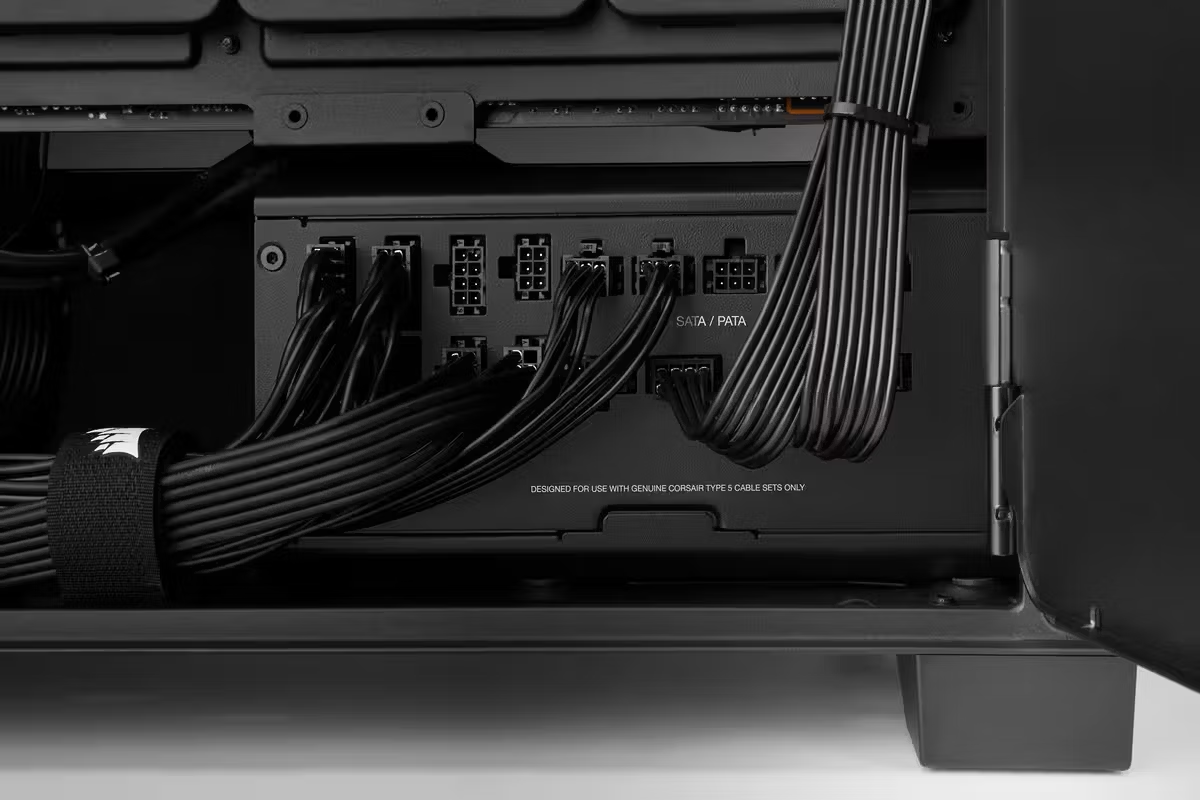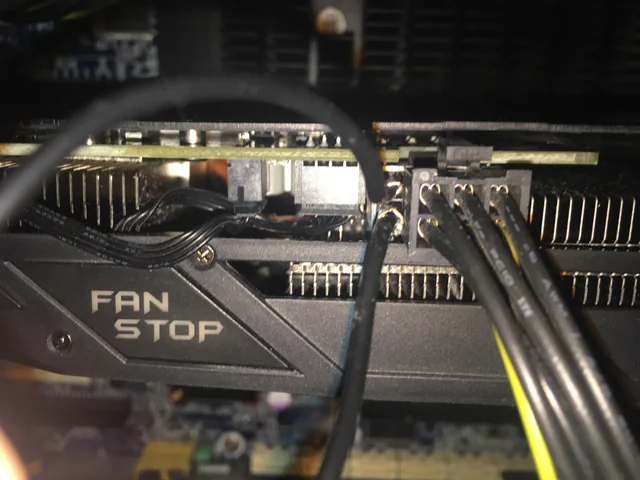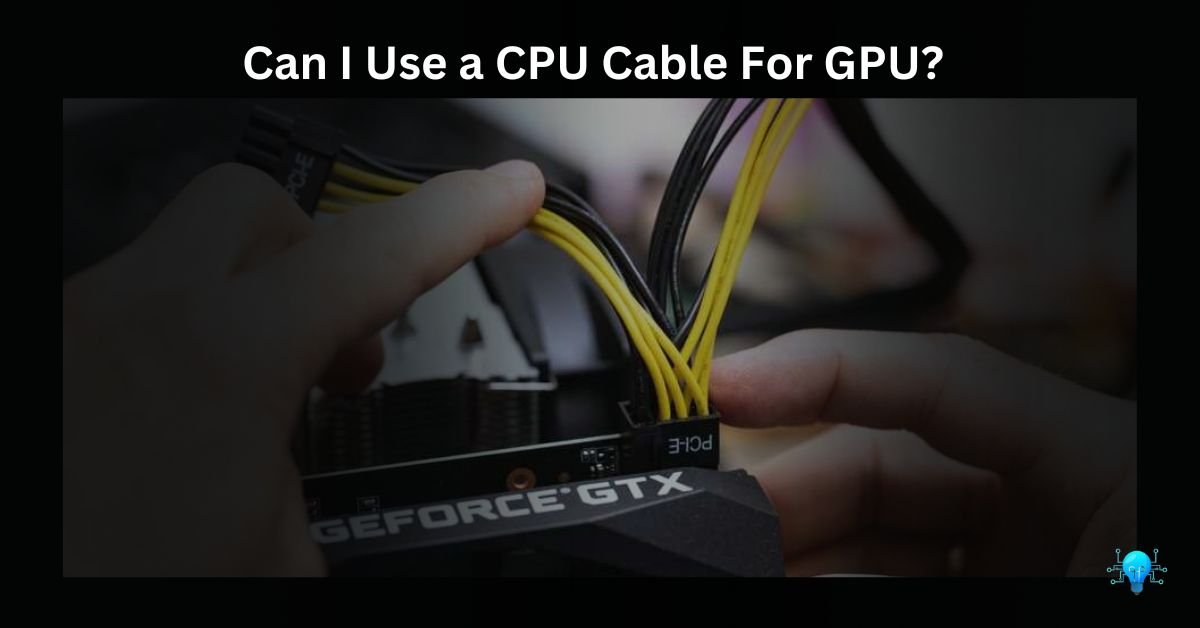I tried using a CPU cable for my GPU because the connectors looked similar. But soon, my computer shut down unexpectedly.
Yes, But It’s Not Recommended! Using a CPU cable for a GPU can damage your components. Despite similar connectors, they’re not interchangeable due to different wiring. Always use the right cables for your hardware to avoid damage.
We’ll discuss why using a CPU cable for your GPU is not recommended and what you should do instead to avoid potential damage to your components.
What Is The Difference Between GPU Cable And CPU Cable?
The main difference between a GPU (Graphics Processing Unit) cable and a CPU (Central Processing Unit) cable lies in their design and purpose.
1. Design:
- CPU Cable (EPS): The CPU cable, also known as an EPS (Extended Power Supply) cable, is designed to supply power to the processor.
- GPU Cable (PCIe): The GPU cable, also known as a PCIe (Peripheral Component Interconnect Express) cable, is designed to power the graphics card.

2. Purpose:
- CPU Cable: CPU cables deliver power specifically to the processor, providing the necessary power for it to function.
- GPU Cable: GPU cables deliver power to the graphics card, ensuring it has the power it needs to operate efficiently.
Can You Use A CPU Cable For GPU? – Clear It Now!
No, it’s not recommended to use a CPU cable for your GPU. Even though they may look similar, CPU and GPU cables are designed differently and deliver power differently. Using the wrong cable can lead to system instability, hardware damage, or even complete system failure. Always use the correct cables for your components to ensure proper power delivery and avoid potential damage.
Recent Post: What Happens When GPU Overheats – Don’t Wait Until It’s Too Late!
Comparison Between CPU (EPS) and GPU (PCIe) Cables:
| Feature | CPU Cable (EPS) | GPU Cable (PCIe) |
| Design | Designed for the processor (CPU) | Designed for the graphics card (GPU) |
| Connector Type | EPS (Extended Power Supply) | PCIe (Peripheral Component Interconnect Express) |
| Purpose | Supplies power to the CPU | Supplies power to the GPU |
| Power Delivery | Provides power to the processor | Provides power to the graphics card |
| Number of Pins | 4+4 pins (8 pins total) | 6 pins or 8 pins |
What Happens If You Connect A CPU Cable To A GPU? – Using CPU cable for GPU!!!
If you are using CPU cable for GPU, you’ll likely short-circuit the power supply unit (PSU) because the pinouts are different. Additionally, you won’t be able to physically fit a CPU cable onto a graphics card as they are keyed differently. To properly power your GPU, you’ll need to use the correct PCIe cables or consider alternative cable options like a Corsair 12VHPWR cable.
Also Read: My GPU Only Has 1 HDMI Port – Is It Good Or Not!
What Should I Do If I Accidentally Use A CPU Cable For My GPU? – Preventions Here!
First, turn off your computer right away to stop any problems from getting worse. Then, carefully unplug the wrong cable from your GPU. Check to see if there are any signs of damage, like melted parts, on your GPU or the power supply. Once you’ve removed the wrong cable, connect the GPU with the right PCIe power cables.
After you’ve fixed the cables, turn on your computer again to see if everything works okay. Keep an eye on your computer to make sure it doesn’t have any problems starting up or running. If you notice any damage to your GPU or other parts, you might need to replace them.
And remember all those asking “Can CPU cable be used for GPU”, It’s a good idea to be extra careful with your cables in the future to avoid making the same mistake again.
Have You Explored? How Much GPU Should A Game Use? – Discover The Ideal!
Why Are CPU And GPU Cables Designed Differently?
CPU (EPS) and GPU (PCIe) cables are designed differently to make sure your computer parts get the right amount of power. They look different and have different shapes, so you don’t plug them into the wrong place by mistake.

The reason they’re different is that your CPU and GPU need different amounts of power to work properly. If you use the wrong cable, it could give too much or too little energy, which could break your parts. So, the cables are made differently on purpose to keep your computer safe and working well.
Do You Know? How Much GPU Utilization Is Normal? – Do This Rightly!
Can I Use 8 Pin CPU Cable For GPU?
No, an 8-pin CPU cable is not compatible with a GPU. GPUs typically require a 6-pin or 8-pin power cable specifically designed for them. Using an 8-pin CPU cable for a GPU could potentially damage either the GPU or the power supply.
Always use the correct cables to ensure the safety and proper functioning of your components. You can visit this Quora discussion for more information about using an can I use 8 pin CPU cable for GPU.
Is It Safe To Use 6-Pin To 8-Pin? – Can you use CPU power cable for GPU?
Using a 6-pin to 8-pin adapter can be risky if your GPU draws more power than the adapter and your power supply can handle. To make it safer, you can use software like MSI Afterburner to lower your GPU’s power limit.

For example, if your GPU needs 225 watts but your adapter and power supply can only handle 150 watts, it could be dangerous. But if you lower your GPU’s power limit to 150 watts, it’s safer to use the adapter, even though your GPU won’t perform as well. Learn more on Reddit.
Can I Damage My GPU By Using The Wrong Cable?
Yes, using the wrong cable can potentially damage your GPU. If you connect a CPU cable to your GPU, it may not get the right amount of power, which can cause serious problems. It’s important to use the correct cables to avoid damaging your components. If you accidentally use the wrong cable, it’s best to fix the problem as soon as possible to prevent any damage.
Read Also: Torch Is Not Able To Use GPU – A Troubleshooting Guide!
Some Confusions You May Have:
PSU CPU Cable for GPU
Using a PSU CPU cable for a GPU is not recommended due to different pin configurations and voltage requirements. CPU power cables typically have an 8-pin EPS connector designed for the motherboard, while GPUs use 6-pin, 8-pin, or a combination of PCIe connectors. Incorrect cabling can lead to component damage or system instability, so always use the appropriate cable specified for each device.
PCIe or CPU Cable for GPU
When connecting a GPU, always use a PCIe power cable rather than a CPU power cable. PCIe cables are specifically designed to meet the power requirements of graphics cards and have connectors like 6-pin or 8-pin (6+2) configurations. In contrast, CPU power cables (often 4+4 pin) are intended for the motherboard’s CPU power socket. Mixing these cables can result in electrical issues and potential hardware damage.
How to Correctly Connect PSU Cables and Power a GPU?
- Find PSU cables labeled “PCIe.”
- See if GPU needs 6-pin, 8-pin, or both.
- Plug PCIe cables into the GPU’s power ports.
- Ensure connections are firm and snug.
- Double-check all connections before powering on.
Corsair CPU Cable for GPU
Corsair CPU cables are designed exclusively for delivering power to the CPU and should not be used for GPUs. These cables feature an 8-pin EPS connector for motherboard CPU power inputs. For GPUs, Corsair provides dedicated PCIe power cables that fit the 6-pin or 8-pin connectors on graphics cards. Using the correct cables ensures compatibility and protects your components from electrical damage.
How can I find the specific cables I need for my GPU?
- Check the GPU manual or specifications sheet.
- Check PSU outputs for cables labelled “PCIe.”
- Look for labelling or colour differences on the cables.
- Consult the PSU manual for cable details.
- Visit the manufacturer’s website for more information.
- Contact the manufacturer’s customer support if needed.
For Further details you can check the guide we have crafted specifically over this factor for your ease.
Frequently Asked Questions:
Is it safe to use an adapter to convert a CPU cable for use with my GPU?
It’s not recommended. Even with an adapter, the different wiring in CPU and GPU cables can cause compatibility issues and potential damage to your components.
How can I power my GPU if my PSU doesn’t have enough PCIe connectors?
If your power supply doesn’t have enough PCIe connectors for your GPU, you can use Molex to PCIe adapters or consider upgrading to a power supply with more connectors.
Can You Use CPU PSU Cable For GPU?
No, you cannot use a CPU PSU cable for a GPU. CPU and GPU power cables have different pin configurations and voltage requirements, and using the wrong cable can damage your components. Always use the correct cable specified for each component.
How can I ensure I’m using the right cables for my GPU?
Always use the cables that come with your power supply unit (PSU) and are specifically designed for your GPU. If you’re unsure, refer to your power supply and component manuals or consult with a knowledgeable professional.
Is it possible to use an 8-pin CPU cable to power a GPU?
No, it is not possible to use an 8-pin CPU cable to power a GPU. The connectors have different pin configurations and voltage specifications, which can cause damage to your components. Always use the correct PCIe cable for GPUs.
Conclusion:
Using a CPU cable for a GPU can potentially lead to serious damage to your components. It’s essential to use the correct cables to ensure the safe and proper operation of your computer. Always double-check cable labels and connector shapes to avoid any mistakes.
By following these guidelines, you can protect your components and enjoy trouble-free performance from your GPU.

